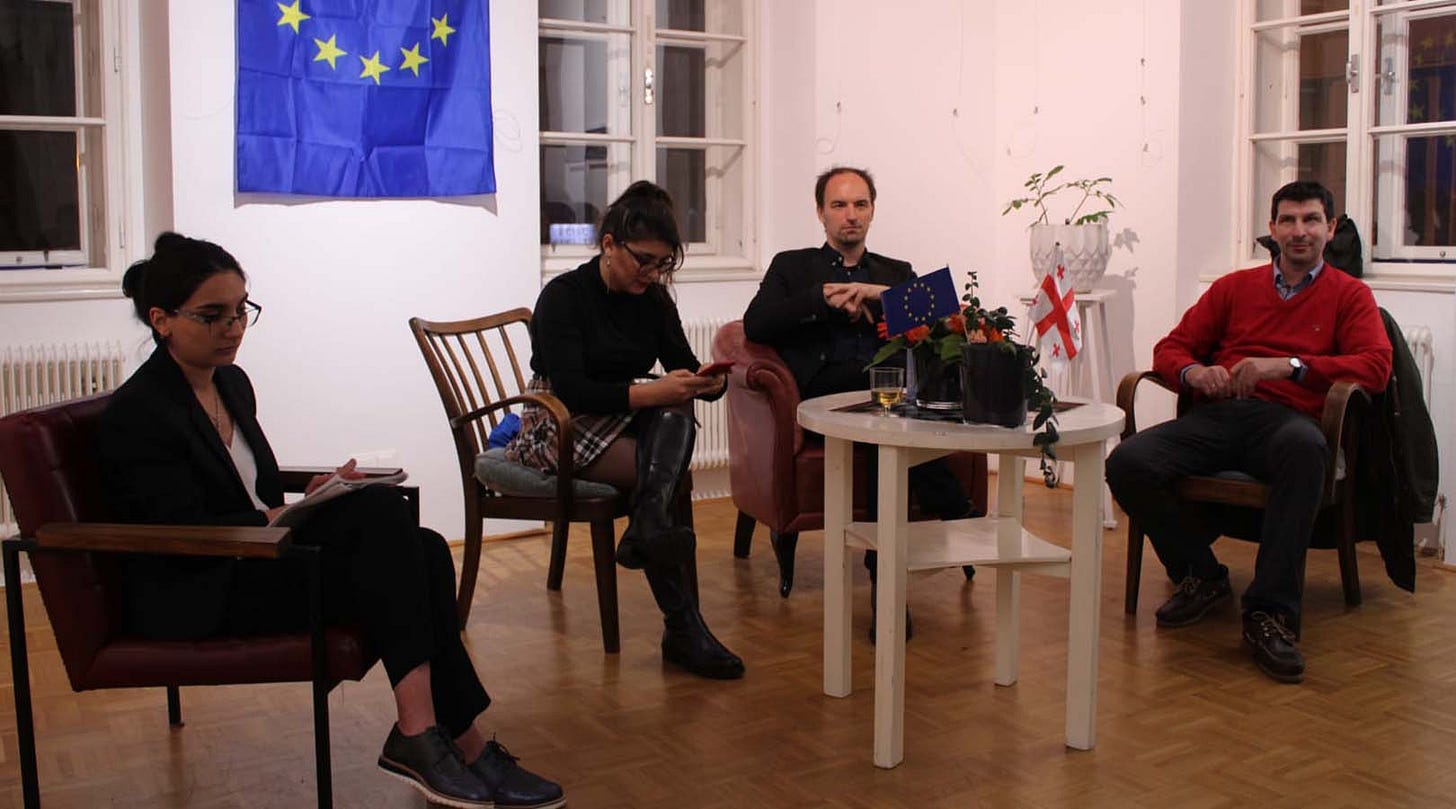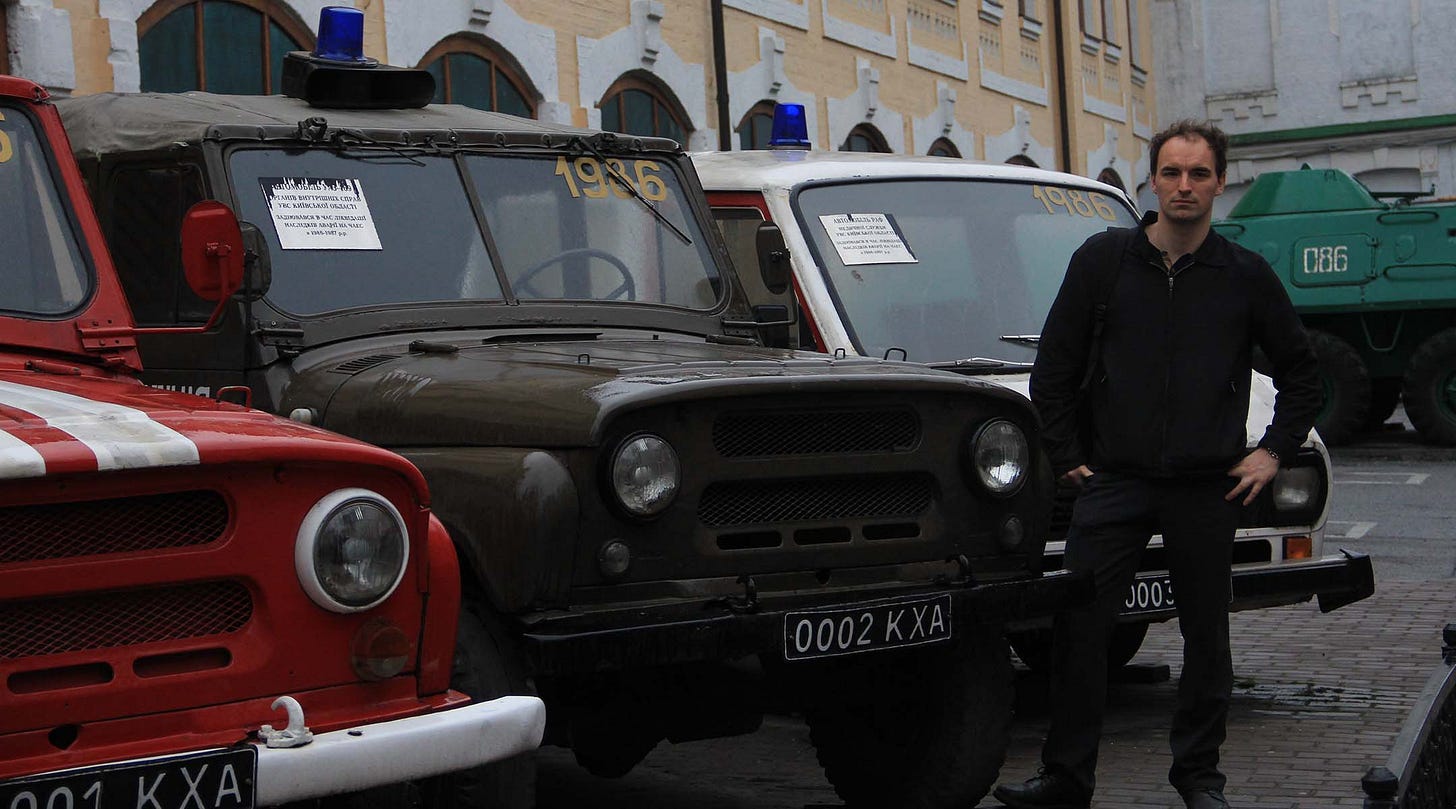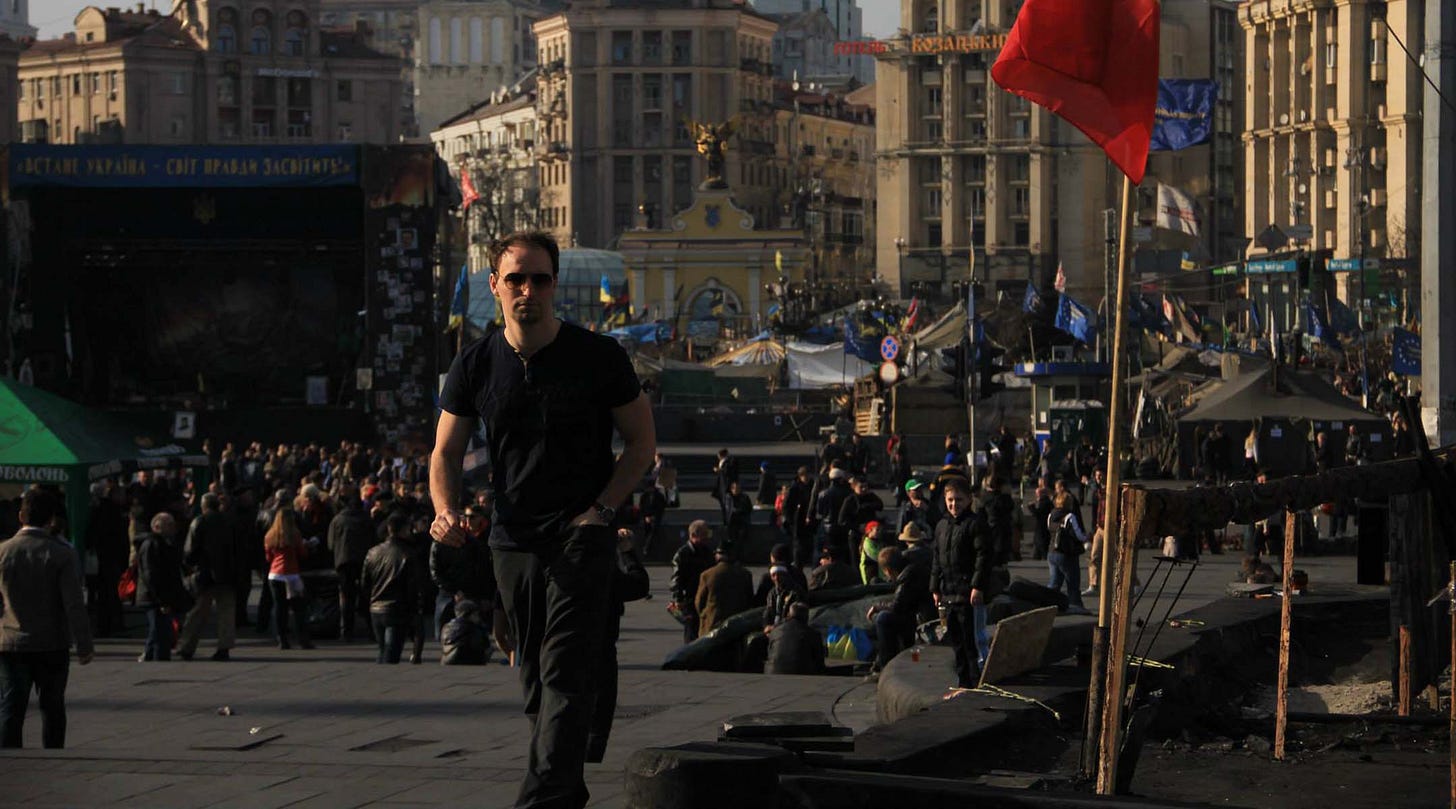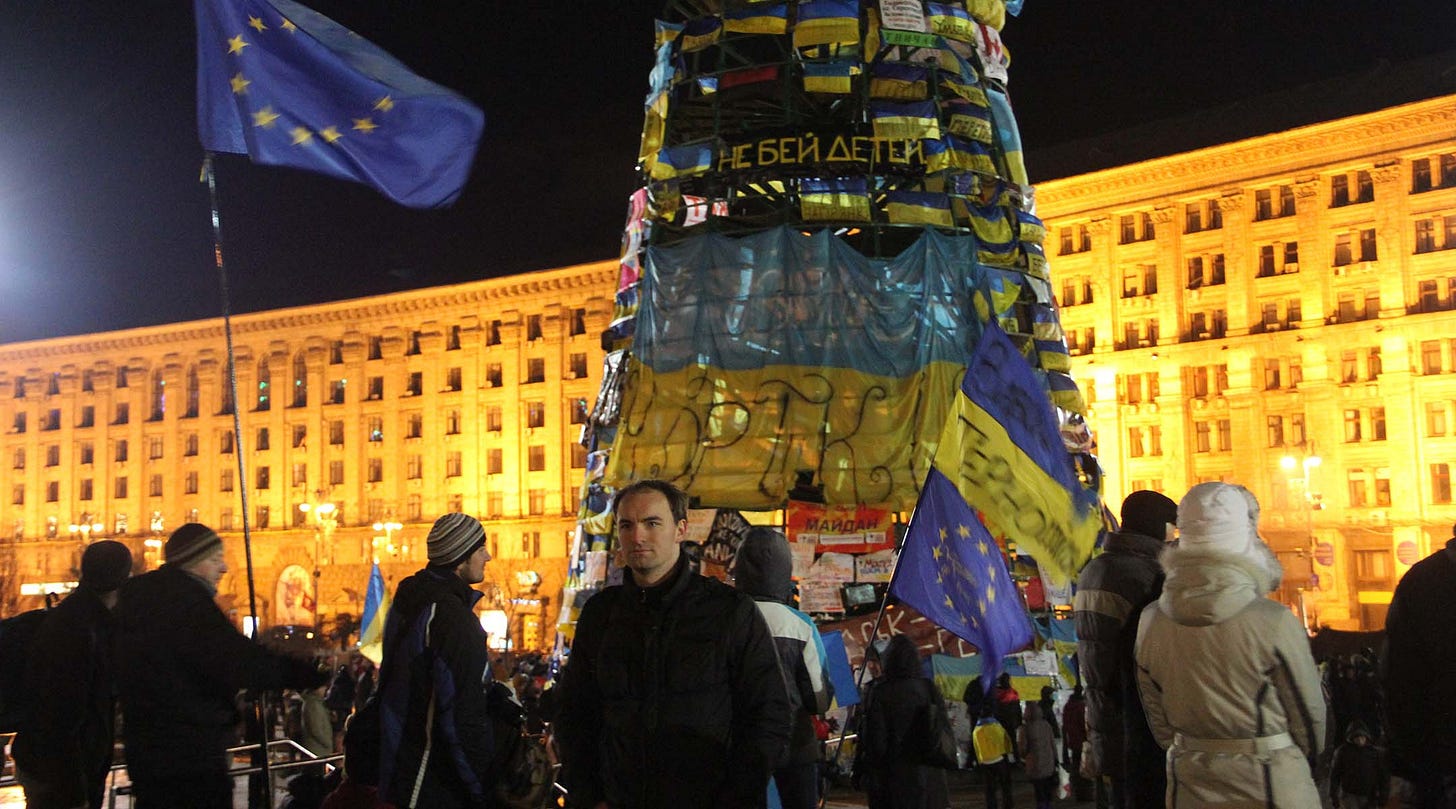Jun 3: Dietmar Pichler, Austria's neutrality sometimes goes so far as to seek equality between aggressor and defender
Interview as published in Ukrinform on April 15, 2023
Austria's neutrality sometimes goes so far as to seek equality between aggressor and defender
Inteview with Dietmar Pichler, Ukrinform, April 15, 2023
Before February 24, 2022, Austria - a neutral country, but at the same time a member of the EU that sanctioned Russia - was quite pro-Russian. The red carpet was rolled out for Putin in Vienna, and the Austrian leadership was happy to visit Russia and sign multi-billion contracts. The Austrian media called Russia's ongoing hybrid war in eastern Ukraine a "conflict" or "crisis," with no link to Russia, or sometimes, in general, it was called a "civil war" in the Kremlin's style.
How did the situation change after February 24? How strong is Russia's influence in the country and who are the main drivers of Russian narratives? Is the federal government fighting Russian disinformation, including the one that concerns Ukraine, and how successfully? What is the perception of Russia's war against Ukraine through the prism of Austrian neutrality?
Ukrinform spoke about these and other issues with Dietmar Pichler, an Austrian disinformation expert and a co-founder of the Vienna-based Center for Digital Media Literacy (Zentrum für Digitale Medienkompetenz).
OLD RUSSIAN NARRATIVES HAVE RETURNED TO AUSTRIA SINCE LAST SUMMER, EXCEPT FOR ONE
- After February 24, 2022, the world, for the most part, was clear in defining what was happening and condemning Russia's war of aggression against Ukraine, unlike the same events in 2014. What do you think was decisive in this?
- People somehow understood that the annexation of Crimea was an aggressive act against international law by the Russian Federation. However, the same cannot be said about the Russian aggression in Donbas. Despite warlords like Girkin and Borodai, soldiers "on vacation," Russian money and weapons, and several radical groups sent from Russia to Donbas, many people still misunderstood it as an "internal conflict of Ukraine." This includes several politicians who wanted to continue doing business with Russia. Russian disinformation provided the groundwork for such a wrong perception.
In comparison, it was impossible to ignore the full-scale invasion in 2022: almost nobody in the West bought the wording "special operation" by the Kremlin, and it was “officially” communicated that Russian troops are fighting on Ukrainian soil.
- Can we say that the Russian propaganda machine lost this information battle, at least in the stage before the full-scale invasion and its first stage?
- I would differentiate between the days before the full-scale invasion and the days after the invasion in 2022. Especially in Austria during the days before the invasion, we could read a lot of quite pro-Russian narratives. Instead of correctly reporting that "Russia claims to feel threatened by NATO," the media reported "Russia feels threatened by NATO." We heard that "NATO expansion was a provocation for Russia" without mentioning the security interests of, for instance, the Baltic States and Poland.
Some even made fun of the warnings of a large-scale invasion. However, after February 24th, the tune changed. For some time, solidarity with Ukraine and outrage over the Russian attack dominated the discourse, but that state did not last long. Since last summer, we have heard the same old Russian narratives, except for the claim that Russian troops are not active in Ukraine.
MANY PEOPLE ALREADY UNDERSTAND THAT THIS IS A WAR OF DICTATORSHIP AGAINST DEMOCRACY
- How successful has Ukraine been in conveying its narratives about Russia's aggressive war against the Ukrainian people, and how do you generally assess Ukraine's strategic communications and soft power in the struggle for the perception of a warring Ukraine in the world?
- Soft power is very important in gaining support, not only from politicians but also from the general public in democratic countries. When President Zelensky decided not to leave Kyiv, asking for "weapons instead of a ride," it made a huge impact on the Western audience. People are now more familiar with where Ukraine is located, who Ukrainians are, and what is happening in Ukraine. Unfortunately, that does not include the events from 2014. Even more, supporters of Ukraine's resistance against the full-scale invasion by the Russian Federation are not very well informed about the events of 2014/2015.
The clear response by the European Union and the steady support of the United States shows that the call for help and international lobbying for support by Ukrainian officials was indeed successful. Many, but unfortunately not all people, understand that there are not "two former Soviet republics" fighting, but a dictatorship against a democracy. It may sound less relevant now, but cultural diplomacy still plays a huge role. As we see now, the biggest supporters of Ukraine are people who have traveled to the country. During Yanukovich's times, we did not see efforts of cultural diplomacy, and after that, the war in Donbas prevented tourism and overshadowed cultural initiatives. The EU candidate country status is a very important achievement of Ukrainian diplomacy and helpful in understanding the values Ukrainians are fighting for.
GROUP WITH "SOFT" RUSSIAN NARRATIVES MORE DANGEROUS THAN OPENLY PRO-RUSSIAN GROUP
- The self-sacrifice and courage with which Ukrainians are resisting the Russian invasion have caused a wave of interest in Ukraine worldwide. In your opinion, what are the main narratives about Ukraine in the West, particularly in Austria - which, among other things, were imposed by Russian propaganda - that were destroyed during this war?
Firstly, I want to highlight that Austria is one of the countries highly influenced by Russian narratives and has a history of "neutrality" that sometimes goes so far as to seek equality between aggressor and defender, which is morally more than questionable.
We have people who assess the situation as it is. Ukrainians are defending their independence, their right to exist as a free nation, and their path to choose their own destiny towards Europe against the Russian dictatorship.
Then we have people who condemn the war but continue with a list of "justifications," even if they say "nothing can justify the full-scale invasion," but this is exactly what they do. They ask for negotiations without naming what should be negotiated. I think this group, with "soft" Russian narratives, is more dangerous than the last group that is openly pro-Russian, praising the Kremlin and what contemporary Russia stands for.
I would like to add that the biggest problem with the group that asks for "immediate negotiations and stopping the fighting at all costs" is that they are not aware of the situation in the occupied territories and the war crimes happening there. Not only Russian TV propagandists, but also Kremlin officials openly communicate their ideas of cultural genocide, but these goals and activities are not well known among the Austrian public. The idea that "if the fighting stops, the suffering stops" is widespread. Some people who spread this view are possibly paid by the Kremlin, while others are just not well-informed about the actual situation in Ukraine and Russian goals there.
KREMLIN PROPAGANDA IN THE EU IS UNSUCCESSFUL, BUT PUBLIC OPINION IS DIVIDED
- At the same time, Russia is trying to undermine the unity of the West in supporting Ukraine through various influence operations and disinformation campaigns to reduce this support and weaken the sanctions regime. In your estimation, how successful have the Kremlin's actions been in the EU countries so far?
- I would say that if we take a look at the support and unity regarding Ukraine, it seems that the campaigns were not very successful, even though the scale of support could be bigger and better organized.
On the other hand, we have public opinion that is very divided, especially when it comes to "negotiations at all costs" and the delivery of weapons to Ukraine. Surveys show that in countries like Germany, Austria, Slovakia, Bulgaria, Greece, and Italy, there is a huge impact of Russian narratives on public opinion.
Russian disinformation was successful in convincing many people that "NATO expansion was a trigger for Russia", that "Ukraine needs to be neutral for the sake of Russia's security interests", and that "Ukraine was to blame for the events of 2014".
RUSSIAN NARRATIVES ARE SPREAD MOST BY THE FAR RIGHT AND FAR LEFT
- How vulnerable is Austria to Russia's disinformation campaigns, and what does Russia exploit most in Austrian society to spread its narratives successfully?
- Austrian society is very vulnerable to Russian disinformation campaigns because, unfortunately, we have not taken efforts to tackle that threat since 2014. We have professors who teach at our universities and give interviews to Russia Today, Sputnik, and Iranian state media, spreading Russian or even Soviet narratives for decades. Despite the clear situation, we tend to analyze things "neutrally," even if we depart from reality. Although RT and Sputnik are banned in the EU now, press releases by the Russian Federation find their way to our media, sometimes not reported in the context of the Russian disinformation machine. People are not well informed about Ukraine at all, making them even more vulnerable to Russian disinformation. In political talk shows, several guests are able to spread Russian narratives with almost no resistance. This "false balance" situation is very common and fueled by our "ideology of neutrality." Like in all countries, Russian narratives are most spread and believed by the far right and far left in terms of ideology.
The "we want peace with Russia" position is also common at people who blame sanctions for Europe's economic situation, rather than attributing it to the Russian war of aggression.
- How did the events of February 24 affect Austrian perceptions of Russia and, thus, the narratives spread by the Kremlin?
- Even though the effect was smaller than in other countries, there have been slight improvements in the discourse. More people are now critically questioning pro-Russian positions and our close economic ties with the Russian Federation. However, considering the situation in Ukraine, the developments within Russia, and the goals of the Kremlin, the change in discourse and view of Russia is still far from being based on reality.
MAIN DISTRIBUTORS OF RUSSIAN PROPAGANDA IN AUSTRIA ARE FREEDOM PARTY AND SOME POLITICIANS FROM SOCIAL DEMOCRATS
- Who are the main distributors of Russian propaganda in Austria today?
- The far-right "Freedom Party" is widely known for spreading Russian narratives, particularly after signing a contract with "United Russia" in 2016. However, some politicians from the Social Democrats and especially the Communist parties also disseminate Russian narratives on TV and social media. Speaking of social media, it is one of the main channels where not only trolls but also so-called "intellectuals" or "peace activists" spread their pro-Russian disinformation narratives. The most famous ones are frequently invited to mainstream TV to speak in political talk shows.
At the end of November 2022, I traveled to Ukraine to hold a workshop about the impact of Russian disinformation in the country, with Ukrainian journalists. The group was surprised by how strong the impact of Russian disinformation is in the German-speaking world. One woman summarized it by saying, "I cannot believe what people in Germany and Austria are believing."
- President Zelensky recently gave a speech at the Austrian parliament. What were the reactions in Austrian society?
- President Zelensky's recent video speech in the Austrian parliament created a huge stir in Austria, with some finding it controversial due to Austria's history of "neutrality" being interpreted in a political way. The pro-Russian leaning Freedom Party of Austria (FPÖ) protested against the speech by leaving the parliament. Outside the parliament, a rally was held against the speech by far-right, far-left, "peace activists," and conspiracy theorists.
What was particularly interesting was that over 50% of the Social Democratic MPs chose not to attend the speech, leading to a broad discussion about their relationship with Russia and the lack of solidarity towards Ukraine. As a result, five Austrian journalists contacted the speaker for information on pro-Russian narratives within the SPÖ. For the first time since the annexation of Crimea, a much-needed discourse has been initiated. Fortunately, many Social Democrats do not support the pro-Russian groups within their party, who claim to be "in favor of neutrality." In reality, these groups not only have a pro-Russian bias, but they also tend to defend or support countries like Venezuela, Cuba, China, or, in some cases, even Iran.
Austria does not have a communist party in parliament, unlike "the Left" in Germany, so such ideologies are present under the wing of the Social Democratic party for decades. Some SPÖ MPs refer to their critics as "NATO trolls," request to stop "war cruelties on both sides," and label President Zelensky's speech as "war propaganda in the parliament." They do not represent the entire party, which provides an opportunity for the Social Democrats to decide on a way of "democratic foreign policy," as one member of the party suggested.
Unfortunately, the lower ranks of the party appear even worse, particularly regarding social media, where some party members post "RT," Russian embassy content, conspiracy theories, and obscure Russian narratives. It is hoped that not only Austrian society but also the party itself will scrutinize these wings in the party and their role for the Social Democrats, who are already in crisis in Austria.
AUSTRIA'S GOVERNMENT NOT DOING ENOUGH TO COMBAT FOREIGN DISINFORMATION CAMPAIGNS
- How to fight against this propaganda?
- In Austria, we need a new discourse, a new style of discussion, especially after decades of praising neutrality. I am a member of a security initiative that asks for this new discourse and a new perception on how we should support our European partners and strengthen our security, especially towards Russia. We need to understand Media Literacy and Information Literacy as a matter of national security to protect our democracy. The European Union reacted already in 2014, but our national government did not understand how important this issue is becoming, especially since Russia annexed Crimea and increased activities in information warfare. Awareness for this issue is urgently needed. In the case of the Russian disinfo-campaign against Ukraine we need to educate the whole population in the big picture of what was happening and what is happening: Means from the annexation of Crimea, to the Russian aggression in Donbas, MH17, until the full-scale invasion 2022. What is also important to teach the audience about the situation in the occupied territories, the genocidal campaign by Russian propaganda and also the domestic situation in Russia, including jailing of people who are against the war.
- Does Austria have effective initiatives to increase media literacy and combat disinformation, and what role does the Austrian media play in this regard?
- Austria's efforts to establish media literacy or information literacy are superficial and not specialized in countering foreign disinformation. Moreover, the government has not made significant efforts to counter foreign disinformation campaigns by authoritarian regimes, particularly Russia. There is no task force in place, nor any information campaign to educate the population about the events in Ukraine since 2014.
While the media has started to address the issue of Russian disinformation more thoroughly, especially after the full-scale invasion in 2022, we need further efforts to show and explain the big picture of the Russian aggression against Ukraine since 2014, as significant knowledge gaps still exist.
Overall, Austria should prioritize developing more specialized approaches to counter foreign disinformation campaigns, and the government should take concrete steps to educate the public and raise awareness about these issues.
SANCTIONS AGAINST PROPAGANDISTS MAY BE PART OF THE SOLUTION
- Ukraine has vast experience in countering Russia's hybrid warfare, of which information warfare is also a part. Against this backdrop, the Ministry of Culture and Information Policy of Ukraine launched the so-called "Information Ramstein" initiative to unite and better coordinate international efforts to counter Russian disinformation and propaganda and to support Ukrainian media. How do you feel about this initiative, and what do you see as its prospects?
- I believe that the idea of coordinating and sharing international efforts and experiences is always a good one, and we need plenty of forums to facilitate this. On one hand, we need to exchange information and provide regional experiences. On the other hand, we should not forget about reaching the general public, and not just “preaching to the converted”.
- As part of this "Information Ramstein" initiative, Ukraine proposes to its partners the idea of criminalizing articles against Russian propagandists at the international level and introducing the concept of the crime of using information weapons at the EU level. Can this work in the fight against Russian propaganda?
- We need a multilevel approach to effectively combat disinformation in the European Union. One factor can indeed be to identify propagandists and sanction them accordingly, especially when they are paid by foreign governments like Russia.
- How can EU legislation be improved to prevent disinformation campaigns in Europe?
- If individuals are paid by a foreign power to engage in propaganda here, the European Union should also have the means to respond accordingly. This also applies to the member states. However, freedom of expression is a valuable asset, which is why such measures must be carefully and cautiously considered.
UKRAINE NEEDS TO REACH PUBLIC OPINION IN BRAZIL, SOUTH AFRICA AND INDIA
- While Europeans already know who Ukrainians are and what kind of war is going on in the country, the situation in Asia, Africa, and Latin America is not the best in this regard because of the large presence of Russian media. What are your suggestions for conveying the truth about Russia's war of aggression against Ukraine and countering Russian narratives in the countries of the so-called "Global South"?
- I believe that the Ukrainian government's initiative to improve and strengthen relations with African states is a positive step forward. Many countries in Africa are autocratic states, which makes Russia and China their "natural partners". This not only complicates the situation for Ukraine but also for other Western democracies. Given the Russian aggression, Ukraine could benefit from a pragmatic approach to building ties with these countries, something that the US, Germany, or the United Kingdom may find more challenging.
In my opinion, it is crucial for Ukraine to focus on countries such as Brazil, South Africa, and India. These countries are democracies, where public opinion has a significant influence on government decisions. If Ukraine can effectively communicate its message to the public in these countries, it may lead to a shift in political perspectives. This approach could also be applied to other countries in Central and South America.







